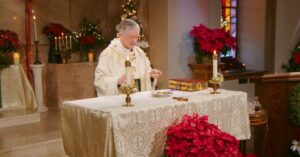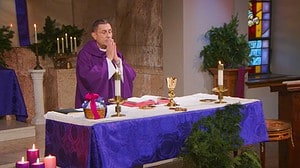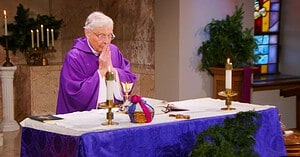Third Sunday in Ordinary Time
Homily Video
Third Sunday in Ordinary Time Homily Transcript
>>I’d like to begin by drawing out the parallels between the first reading and the gospel. The first reading that Phil read for us so well and then the gospel.
So, in the first reading we have the prophet Jonah. Now there was a powerful event that happened in Jonah’s life. He was called by God and given a mission to go and preach repentance. Repentance and belief in God who is our Father.
Jonah at first was reluctant, we all know that. At first, Jonah was reluctant. But then ultimately he went and through Nineveh he preached the invitation to repent and to believe in God. And people did. And because of that God saved Nineveh and God saved his people because of the courage and the strength that Jonah had to preach that news of repentance and belief.
The parallel with Jesus is striking. Just as Jonah had a bigger event in his life, God calling. And Jesus is God, what happened to Jesus was that He, it was His cousin John the Baptist, who was arrested and imprisoned -and we all know what happened when John the Baptist went to prison. But that was a big event for Jesus. His life was changed and so His response was to start proclaiming and start preaching. And He too, called everyone He encountered to a life of repentance and belief. Repentance and belief. But He didn’t stop there.
He didn’t stop, as Jonah preached all throughout Nineveh. Jesus didn’t stop by just preaching, He actually called disciples to himself. He went along the seashore of the lake and He found some disciples. First Simon Peter and his brother Andrew and then James and John. He called people to Himself and He asked them to follow Him in the most powerful way -He called disciples.
You know, when I think about that invitation from Jesus to repentance and belief, I think about what we do and what’s been a little bit hard to do during this time of covid-19, but the regular pattern of our life is repentance and belief.
Follow me for a second. Repentance and belief, what are those sacraments that we engage in on a regular basis? Reconciliation and the eucharist. Those are the sacraments of repentance and belief. Repentance for those things for which we’re sorry and belief in the eucharist how God wants to be with us so powerfully, so profoundly. And thanks be to God, we’re able to get back to those sacraments a little bit during this time of COVID-19.
You know, I’m going to be 50 pretty soon and I think about my growing up. And back in the day, you know, the trend was that people behaved in one particular way in their faith, cause their parents told them to and then they believed because of that and then they felt like they belonged to the church.
Well today, kids these days -“kids these days.” Kids these days, most people younger than me they actually want to belong first. Especially in this time of disconnection, during this pandemic.
We have to help our young people belong first, in many different ways. Sometimes by sharing our own faith and inviting, just like Jesus did to the four disciples, we’ve got to invite people to belong. And when they belong then they’re going to behave and believe. Ah, so things have changed drastically. Our cultures changed and we have to be the ones who invite people to belong and then behave and believe.
Jonah took on the invitation of God and He preached the good news of repentance and belief, as did Jesus, and drew people to himself. Can we recommit ourselves to drawing people to ourselves and we encounter Christ Jesus in this journey of faith? As we stay connected to repentance, reconciliation, and belief the eucharist?
That’s what Jesus invites us to, and asks as His disciples we follow.
Discover More
The Nativity of the Lord
December 25, 2024
Fourth Sunday of Advent
December 22, 2024
Third Sunday of Advent
December 15, 2024
Request Sunday Mass Guide
The Sunday Mass Guide sent to your home address
Spiritual nourishment and updates from the Sunday Mass community
Monthly reflections from Fr. Scott Donahue, our Principal Celebrant


